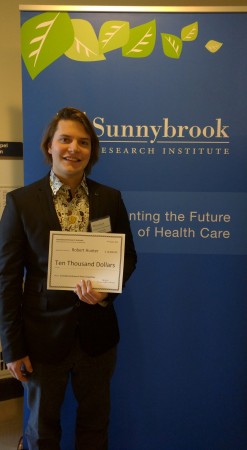A University of Guelph biomedical engineering student has won the prestigious 2016 Sunnybrook Research Prize worth $10,000.
Robert Hunter beat out nine other finalists from across Canada. He presented his research on using biosensors for diagnosis, management and tracking of diabetes to a judging panel Jan. 8.
“My initial reaction was one of complete shock; there were a lot of great presentations from students from all over the country,” Hunter said.

“I didn’t think about it as a competition, more as a chance to share my work and ideas. This is the mindset I had going into it, so I felt very relaxed.”
The annual competition is intended to recognize excellence in undergraduate research and promote careers in biomedical research.
“My education at U of G is what made this success possible,” Hunter said. “I think that the constant focus on complete design in our engineering program is what set this project apart in the competition. It’s given me a lot of experience in troubleshooting and thinking critically about design decisions, as opposed to focusing solely on theory.”
Hunter works in U of G”s BioNano Lab led by engineering professor Suresh Neethirajan. He plans to pursue graduate studies in bioengineering.
“Winning this prestigious and highly competitive Sunnybrook Research Prize is a remarkable achievement, and raises Guelph’s research profile at the national level,” Neethirajan said.
“This award will help Robert to continue to excel in academics and research. Enabling our students to get the best research experience at Guelph is truly rewarding.”
Hunter used microscopic materials to develop an inexpensive hand-held biosensor that rapidly detects diabetes in a user-friendly home test. It can distinguish between Type 1 and Type 2 diabetes from the same droplet of blood.
It’s the second year in a row that a Guelph student was named a finalist. Last year, Guelph student Evan Wright, who also works in Neethirajan’s lab, made the final round.